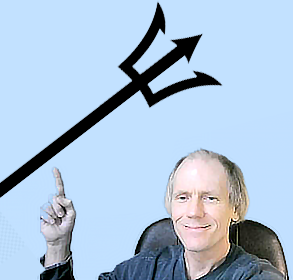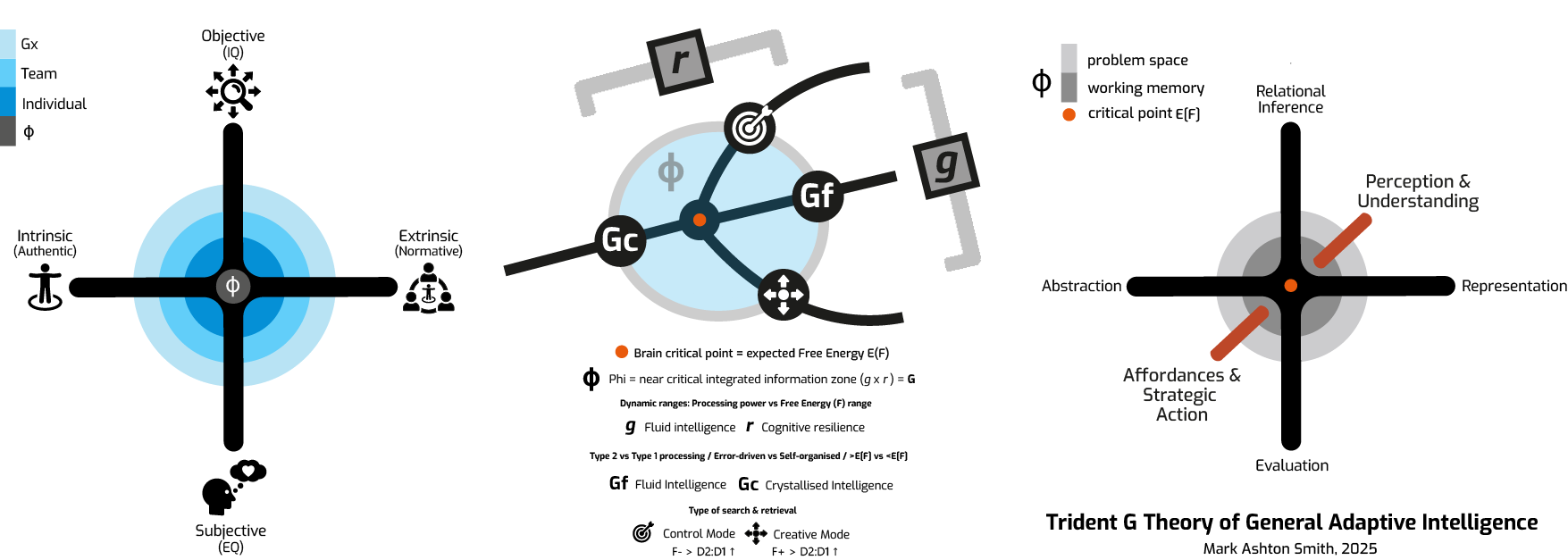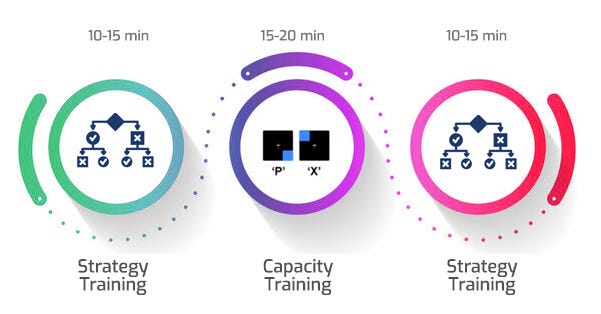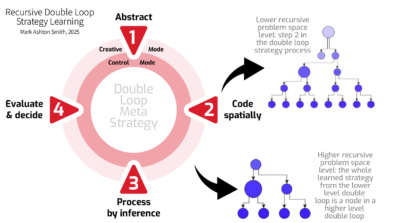
My name is Dr Mark Ashton Smith. I am a cognitive neuroscientist trained at the Center for the Neural Basis of Cognition. For a number of years I was a lecturer and researcher in the Psychology Department at the University of Cambridge. I am currently a Lecturer in Cognitive Psychology & Neuroscience at the University of Essex Online. (Signup if you are interested in a BPS accredited degree in psychology!) I have been researching cognitive interventions and the principles of effective brain training for two decades. Research in the past few years in cognitive neuroscience has identified a set of principles for effective brain training to increase general intelligence which I have synthesized into a scientifically rigorous framework called Trident G. You can connect with me here.
Trident G Theory: Understanding General Intelligence
The Trident G Theory explains how our minds balance stability (using what we already know) and flexibility (thinking creatively or solving new problems) to adapt to challenges in life. At its core is the idea of a “generative model,” which is like the brain’s prediction engine. This model helps us make sense of the world, plan actions, and regulate our thoughts and feelings by comparing what we expect to happen with what actually happens.
Imagine your mind as a finely tuned system, operating in a “near-critical zone.” This is where your brain is at its best, combining solid, reliable knowledge with the ability to think flexibly. Fluid intelligence (Gf) refers to this dynamic, flexible thinking—like coming up with creative solutions or making sense of new information. Crystallized intelligence (Gc), on the other hand, is the solid foundation of knowledge and skills you’ve built up over time. Together, these work with cognitive resilience (r) – your ability to bounce back from challenges and adapt to new situations – to create what I call general adaptive intelligence (G). This combines both IQ and cognitive resilience for overall cognitive performance and adaptability.

Trident G cognitive intervention training framework. Mark Ashton Smith, 2025
A Smarter Approach to Training Your Brain
The Strategy-Capacity Training Method is designed to increase your intelligence – as measured by valid psychometric tests – by improving both mental capacity (your brain’s ability to process and hold information) and strategic thinking skills (how you approach and solve problems). The training is practical, combining working memory and attention exercises with creative, hands-on strategy sessions.

For example, imagine playing a mental game where you have to remember and update information as it changes – this sharpens your ability to think on your feet and stay focused under pressure. At the same time, you’ll practice thinking strategically for problem solving, like how to break down a matrix IQ test problem or plan a big project or solve a complex challenge. By training both these areas together, your brain becomes better at transferring skills from one situation to another—helping you in everything from test taking and understanding ideas to decision-making to learning new skills.
Two Discord Programs Tailored to Your IQ Goals
We offer two specialized programs hosted on the Discord Platform that focus on different aspects of intelligence:
- Strategic Action Program (Tri-SCI-Act): This program helps you plan and execute goals effectively. Think of it as training for smarter, more efficient decision-making and action. You will learn how to organize your thoughts, focus on what matters, problem solve and take action confidently – perfect for tackling big challenges in work or life.
- Comprehension and Reasoning Program (Tri-SCI-IQ): This program builds your ability to understand complex ideas and think analytically and creatively. You’ll practice connecting ideas, reasoning logically, looking at problems from new angles, and finding innovative solutions. Whether it’s improving academic performance or coming up with creative ideas, this program enhances your ability to learn and adapt.
Strategy Training: Training Your Mind to Think Smarter
The training harnesses a novel training protocol called the ‘double loop meta strategy’ that combines two types of thinking:

- Executive Thinking (Control Loop): This helps you focus on clear goals, evaluate your options, and solve problems effectively. Imagine you’re navigating a map—you’ll learn how to take the most direct route to your destination.
- Creative Thinking (Creative Loop): This encourages you to explore new ideas, experiment with different perspectives, and think outside the box. It’s like finding hidden pathways on the map you hadn’t noticed before.
By switching between these two types of thinking, you’ll learn to solve problems in smarter, more flexible ways. For example, if you’re stuck on a decision, creative thinking might help you come up with new options, while efficient thinking helps you choose the best one.
Capacity Training: Building Your Brain’s Core Skills
Throughout the program, you’ll strengthen key skills doing working memory and attention training:
- Working Memory: The ability to hold and work with information in your mind—like remembering someone’s name while having a conversation.
- Focus and Attention: Learning to ignore distractions and stay focused on your goals, while being able to inhibit default responses.
- Relational Thinking: Connecting ideas and seeing how they fit together, helping you make better decisions.
- Resilience: Bouncing back from mistakes and staying sharp even when under pressure.

Why It Works
This method is designed not just to improve specific skills but to help you apply what you learn to real life. By creating mental “maps” of problems and learning how to navigate them, you’ll develop a flexible way of thinking that can handle anything life throws your way. Whether you’re a student, professional, or just someone looking to improve, the Strategy-Capacity Training Method is a powerful way to grow your intelligence and achieve your goals.
More details on the Strategy-Capacity brain training method can be found on my Substack here.
Trident G Research Articles
Ashton Smith, M. (2023). The FEP+ Model of General Intelligence. PsyArXiv. https://doi.org/10.31234/osf.io/65gzh
Ashton Smith, M. (2024a). Trident G: Free Energy & Brain Criticality Based Theory of Intelligence & Resilience. PsyArXiv. https://doi.org/10.31234/osf.io/wnre3
Ashton Smith, M. (2024b). Strategy-Capacity Training: An Intervention Method for Effective Far Transfer. PsyArXiv. https://doi.org/10.31234/osf.io/z6fjt
Ashton Smith, M. (2025). Instrument Development: Trident Ф (Phi) Scale. PsyArXiv. https://doi.org/10.31219/osf.io/5zega
Veloso, G. C., & Ty, W. E. G. (2021). The Effects of Emotional Working Memory Training on Trait Anxiety. Frontiers in Psychology, 11, 549623. https://doi.org/10.3389/fpsyg.2020.549623
This research article has demonstrated both IQ (working memory) gains and improved cognitive resilience using the app I have developed for the Trident G programs:

Foundational Articles For the Trident G Framework
Cattell, R. B. (1963). Theory of fluid and crystallized intelligence: A critical experiment. Journal of Educational Psychology, 54(1), 1–22. https://doi.org/10.1037/h0046743
Friston, K. (2010). The free-energy principle: a unified brain theory?. Nature Reviews Neuroscience, 11(2), 127–138. https://doi.org/10.1038/nrn2787
Jiang, L., Qiao, K., Sui, D., Zhang, Z., & Dong, H.-M. (2019). Functional criticality in the human brain: Physiological, behavioral and neurodevelopmental correlates. PLOS ONE, 14(3), e0213690. https://doi.org/10.1371/journal.pone.0213690
McGrew, K. S., Schneider, W. J., Decker, S. L., & Bulut, O. (2023). A Psychometric Network Analysis of CHC Intelligence Measures: Implications for Research, Theory, and Interpretation of Broad CHC Scores “Beyond g”. Journal of Intelligence, 11(1), 19. https://doi.org/10.3390/jintelligence11010019
Shi, J., Kirihara, K., Tada, M., Fujioka, M., Usui, K., Koshiyama, D., Araki, T., Chen, L., Kasai, K., & Aihara, K. (2022). Criticality in the Healthy Brain. Frontiers in Network Physiology, 1. https://doi.org/10.3389/fnetp.2021.755685